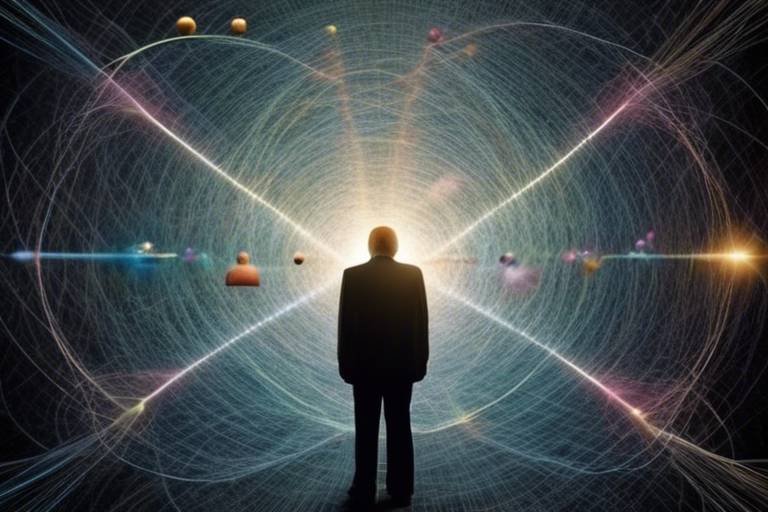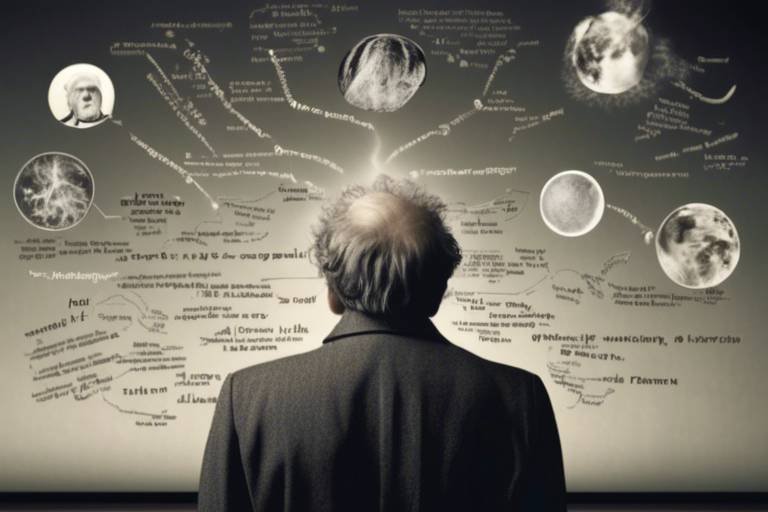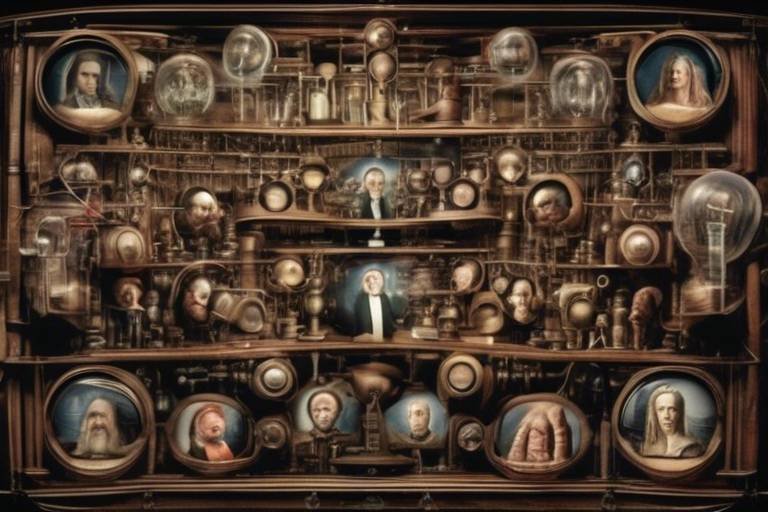Is the Universe Infinite? A Philosophical Examination
The question of whether the universe is infinite is one that has captivated the minds of philosophers, scientists, and curious individuals alike. This inquiry goes beyond mere scientific observation; it dives deep into the essence of existence itself. When we ponder the universe's vastness, we can't help but feel a mix of awe and confusion. Is it a boundless expanse stretching into eternity, or is it a finite entity with edges we have yet to discover? In this article, we will explore the philosophical implications of an infinite universe, examining various perspectives, theories, and the impact on human understanding and existence.
To grasp the idea of an infinite universe, we must first understand what infinity means in a philosophical context. Infinity is often described as something that is limitless or unbounded. Imagine standing at the edge of a cliff, gazing out over an endless ocean. The horizon seems to stretch forever, and the waves continue to roll in without end. This metaphor encapsulates the essence of infinity—no matter how far you look, there is always more to see. In relation to the universe, infinity challenges our understanding of time and space. If the universe is infinite, it suggests that time may also be boundless, raising questions about the beginning and end of existence itself.
Throughout history, thinkers have grappled with the concept of an infinite universe. Ancient philosophers like Aristotle believed in a finite cosmos, while others, such as the Stoics, entertained the idea of an infinite void. Fast forward to modern times, and we find figures like Immanuel Kant, who argued that our understanding of the universe is shaped by human perception. The debates surrounding these ideas have evolved, but the core questions remain relevant today. Consider how the ancient Greeks viewed the universe as a perfect sphere, a reflection of their belief in order and symmetry. In contrast, contemporary thinkers challenge these notions, suggesting a chaotic and ever-expanding cosmos.
When we turn to science, the discussion becomes even more intricate. The Big Bang theory posits that the universe began from a singular point and has been expanding ever since. This expansion raises the tantalizing question: does it ever stop? If the universe continues to grow, does that imply it is infinite? Additionally, the concept of multiverses suggests that our universe may be just one of many, each with its own set of physical laws. This idea opens up a Pandora's box of possibilities, challenging our traditional understanding of existence and reality. The scientific community continues to explore these theories, pushing the boundaries of what we know about the cosmos.
Mathematics plays a crucial role in conceptualizing infinity. Through set theory and calculus, mathematicians have developed tools that help us grasp the abstract nature of infinite sets. For instance, consider the concept of a number line extending infinitely in both directions. This simple yet profound idea illustrates how infinity can be represented mathematically. In cosmology, mathematical models help scientists predict the universe's behavior, allowing us to explore its structure and dynamics. The interplay between mathematics and philosophy leads to deeper insights into the nature of infinity and its implications for the universe.
What does an infinite universe mean for humanity? The existential questions it raises are profound. If the universe is infinite, what is our significance within it? Are we mere specks of dust in a vast, uncaring cosmos, or do we hold a unique place in the grand scheme of things? This notion challenges our understanding of reality and our role in it. It forces us to confront the limits of human comprehension and the nature of existence itself. Some may find comfort in the idea of infinity, while others may feel overwhelmed by it. The philosophical implications of an infinite universe invite us to reflect on our beliefs, values, and the very nature of life.
With great power comes great responsibility. The concept of an infinite universe also brings ethical considerations to the forefront. If we are part of an endless cosmos, what responsibilities do we have toward our planet and each other? The vastness of the universe may imply that our actions have far-reaching consequences, not just for ourselves but for future generations. This perspective can reshape our moral philosophy, urging us to act with greater awareness and consideration for the interconnectedness of all things.
The dialogue between science and philosophy is essential in shaping our understanding of the universe. Key thinkers, such as Albert Einstein and Stephen Hawking, have bridged these disciplines, providing insights that challenge our perceptions. Their work encourages us to question our assumptions and explore the philosophical ramifications of scientific discoveries. As we continue to unravel the mysteries of the cosmos, the collaboration between these fields will be vital in guiding our understanding of infinity and existence.
As we look to the future, cosmic exploration holds the potential for groundbreaking discoveries that may further inform our understanding of the universe's infinity. With advancements in technology, we are now able to probe deeper into the cosmos than ever before. Imagine a future where we can observe distant galaxies, uncovering the secrets of their formation and evolution. This journey into the unknown could reshape our understanding of reality, pushing the boundaries of what we consider possible. The quest for knowledge is never-ending, much like the universe itself.
- Is the universe truly infinite? The nature of the universe is still a topic of debate among scientists and philosophers. Current theories suggest it may be infinite, but more research is needed.
- What is the significance of an infinite universe? An infinite universe raises profound existential questions about humanity's place and significance within the cosmos.
- How do scientific theories influence philosophical thought? Scientific discoveries often challenge and reshape philosophical perspectives, leading to new insights about existence and reality.
- What ethical responsibilities do we have in an infinite universe? The vastness of the cosmos suggests that our actions may have far-reaching consequences, urging us to act with greater awareness and responsibility.

The Concept of Infinity
When we dive into the concept of infinity, we are not just wading into the deep end of mathematical theory; we are embarking on a philosophical journey that challenges our understanding of time, space, and existence itself. Imagine standing at the edge of an endless ocean—each wave representing a different aspect of infinity. The vastness can be exhilarating yet daunting. Infinity, as a concept, is often defined as something without any limit, an idea that stretches our minds and forces us to reconsider the very fabric of reality.
In philosophy, infinity is more than just a number; it symbolizes the potential for endless possibilities. Think about it: if the universe is infinite, then the possibilities for existence, life, and even consciousness are limitless. This idea can be both liberating and terrifying. It raises profound questions: What does it mean for us as human beings? Are we merely fleeting moments in an infinite timeline, or do we hold significance in the grand scheme of things?
To further grasp this concept, we can categorize infinity into two main types: potential infinity and actual infinity. Potential infinity refers to a process that can continue indefinitely, like counting numbers (1, 2, 3, ...). On the other hand, actual infinity is a completed set that contains an infinite number of elements, such as the set of all natural numbers. These distinctions are crucial because they help us understand how infinity can manifest in different contexts, particularly in our universe.
Moreover, the implications of infinity extend beyond mathematics and philosophy; they influence our understanding of cosmology and the universe. If the universe is infinite, then it challenges the notion of a beginning or an end, making the Big Bang theory—a widely accepted scientific explanation for the universe's origin—seem less definitive. Instead of a singular starting point, we might be looking at a vast continuum where time and space loop back on themselves, creating a reality that is both complex and awe-inspiring.
In summary, the concept of infinity invites us to ponder deep philosophical questions about our existence and the nature of reality. As we explore these ideas, we must remain open to the mysteries that infinity presents. It is a reminder that our understanding of the universe is still evolving, and there may be more to discover beyond the horizons of our current knowledge.
- What is the philosophical definition of infinity? Infinity in philosophy refers to an idea that transcends limits, suggesting boundlessness in time, space, and existence.
- How does infinity relate to the universe? An infinite universe implies endless possibilities and challenges our understanding of existence, time, and space.
- What are the two types of infinity? The two types are potential infinity (an ongoing process) and actual infinity (a completed set).
- What are the implications of an infinite universe? An infinite universe raises questions about the nature of reality, human significance, and the limits of understanding.

Historical Perspectives on the Universe
The quest to understand the universe has captivated thinkers for centuries, shaping not only our scientific pursuits but also our philosophical inquiries. From the ancient Greeks to modern cosmologists, the idea of an infinite universe has sparked debates and inspired theories that push the boundaries of human thought. Ancient philosophers like Aristotle and Plato laid the groundwork by proposing models of the cosmos that were both finite and structured. Aristotle, for instance, envisioned a geocentric universe, where Earth was at the center, surrounded by celestial spheres. This model, while limited, provided a framework that influenced astronomical thought for over a millennium.
As we moved into the Middle Ages, the universe was often viewed through a theological lens. Thinkers like Thomas Aquinas sought to reconcile faith with reason, suggesting that the universe was created by a divine being and thus had a definitive beginning. This perspective dominated until the Renaissance, when the advent of the scientific method began to challenge existing beliefs. The heliocentric model proposed by Copernicus, later supported by Galileo and Kepler, revolutionized our understanding of the cosmos, suggesting that the Earth was just one of many planets orbiting the Sun.
Fast forward to the 19th and 20th centuries, and we see a significant shift in how the universe is perceived. The work of scientists like Einstein and Hubble introduced the idea that the universe is not only vast but also expanding. Einstein's theory of relativity opened new avenues for understanding space and time, while Hubble's observations revealed that galaxies are moving away from us, suggesting an ever-expanding universe. This led to the formulation of the Big Bang theory, which posits that the universe began from an incredibly dense and hot state and has been expanding ever since.
Throughout history, the philosophical implications of these scientific advancements have been profound. The shift from a finite to an infinite universe raises questions about our place in the cosmos. If the universe is infinite, what does that mean for our existence? Are we merely a speck in an unending expanse, or do we hold significance in the grand tapestry of reality? These questions echo the sentiments of existential philosophers like Sartre and Heidegger, who grappled with the nature of being and the human condition in an expansive universe.
Moreover, the intersection of science and philosophy continues to evolve. Modern thinkers, such as David Deutsch and Max Tegmark, explore the multiverse theory, suggesting that our universe is just one of many, each with its own set of physical laws. This notion not only expands the concept of infinity but also challenges our understanding of reality itself. The philosophical implications of such theories are staggering, forcing us to reconsider what we know about existence and the nature of the universe.
In summary, the historical perspectives on the universe reveal a rich tapestry of thought that intertwines science and philosophy. From the geocentric models of ancient Greece to the expansive theories of modern cosmology, each era has contributed to our understanding of the cosmos. As we continue to explore the universe, we must also reflect on the profound philosophical questions it raises—questions that have been asked for millennia and will likely persist as long as humanity seeks to understand its place in the vast expanse of space.
- What was Aristotle's view of the universe?
Aristotle believed in a geocentric model where Earth was at the center, surrounded by celestial spheres. - How did the Renaissance change our understanding of the universe?
The Renaissance introduced the heliocentric model, proposing that the Earth orbits the Sun, challenging previous geocentric beliefs. - What is the Big Bang theory?
The Big Bang theory suggests that the universe began from an extremely dense and hot state and has been expanding ever since. - What are the implications of an infinite universe?
An infinite universe raises existential questions about human significance and our understanding of reality.

Scientific Theories of the Universe
The universe is a vast and enigmatic expanse, and scientists have long sought to unravel its mysteries through various theories. At the forefront of this exploration is the **Big Bang Theory**, which posits that the universe originated from an extremely hot and dense state approximately 13.8 billion years ago. This monumental event set in motion the expansion of space itself, leading to the cosmos we observe today. Imagine a balloon being inflated; as it expands, the surface stretches, and points on the surface move away from each other. This analogy helps us visualize how galaxies are receding from one another, a phenomenon first observed by Edwin Hubble in the 1920s.
However, the Big Bang Theory is not the only perspective on the universe's structure. The concept of **multiverses** has gained traction in recent years, suggesting that our universe might be just one of many. This idea stems from various interpretations of quantum mechanics and string theory, leading to the notion that there could be parallel universes with different physical laws and constants. It’s like being in a vast library where every book represents a different universe, each with its own unique story. This theory raises intriguing questions about the nature of reality and existence, pushing the boundaries of our understanding.
As we delve deeper into the cosmos, we encounter the **Cosmological Principle**, which asserts that the universe is homogeneous and isotropic when viewed on a large enough scale. This principle underpins many cosmological models and suggests that the universe looks the same from any point within it. Think of it as standing in the middle of a perfectly symmetrical room; no matter where you look, the walls, ceiling, and floor appear identical. This idea has significant implications for our understanding of the universe's structure and evolution.
Another compelling theory is the **Inflation Theory**, which proposes a rapid expansion of the universe during its earliest moments, just after the Big Bang. This theory helps to explain the uniformity of the cosmic microwave background radiation and addresses some of the puzzles left unanswered by the Big Bang alone. Imagine a pot of boiling water; when you turn up the heat, the water bubbles and expands rapidly, creating a chaotic yet uniform surface. Similarly, inflation suggests that the universe underwent a phase of exponential growth, smoothing out any irregularities.
To summarize, here are some of the key scientific theories that shape our understanding of the universe:
- Big Bang Theory: The prevailing cosmological model explaining the universe's origin and expansion.
- Multiverse Theory: The idea that our universe is one of potentially infinite universes.
- Cosmological Principle: The assumption that the universe is homogeneous and isotropic on a large scale.
- Inflation Theory: A rapid expansion of the universe in its early moments to explain its uniformity.
These theories not only illuminate the complexities of the universe but also challenge our perceptions of reality. As scientists continue to gather data and refine their models, the quest to understand the universe's true nature remains an exhilarating journey, filled with surprises and revelations. The interplay between these scientific theories and philosophical questions about existence creates a rich tapestry of inquiry that invites us to ponder our place in the cosmos.
- What is the Big Bang Theory? The Big Bang Theory is the leading explanation for the origin of the universe, suggesting it began as a singularity and has been expanding ever since.
- What is the multiverse theory? The multiverse theory posits that our universe is just one of many, each potentially having different laws of physics.
- How does inflation theory explain the universe's uniformity? Inflation theory suggests a rapid expansion in the early universe, smoothing out irregularities and leading to the uniform cosmic microwave background we observe today.

The Role of Mathematics in Understanding Infinity
Mathematics serves as the backbone of our understanding of infinity, providing the language and tools necessary to explore this profound concept. When we think about infinity, it’s easy to get lost in the abstract nature of the idea. However, mathematics allows us to make sense of it through rigorous definitions and frameworks. For instance, the concept of infinity is not merely about "something that goes on forever"; it encompasses various forms, such as potential infinity, which refers to an unending process, and actual infinity, which considers infinity as a completed quantity. This distinction is crucial as it shapes our understanding of mathematical infinity and its implications for the universe.
One of the most significant contributions of mathematics to the study of infinity is found in set theory. Developed by Georg Cantor in the late 19th century, set theory introduces the idea that not all infinities are created equal. Cantor famously demonstrated that the set of real numbers is "more infinite" than the set of natural numbers, leading to the concept of different sizes of infinity. This revelation not only challenged traditional views but also opened up new avenues for philosophical inquiry regarding the nature of the universe.
Another vital mathematical tool in understanding infinity is calculus. Through calculus, mathematicians can analyze functions that approach infinity, allowing for the exploration of limits and continuity. For example, consider the function f(x) 1/x as x approaches zero. The behavior of this function illustrates how values can grow infinitely large, giving us insight into the nature of infinite processes. Calculus enables us to model real-world phenomena, from the expansion of the universe to the behavior of particles at a quantum level, all while grappling with the concept of infinity.
Mathematics also plays a role in cosmological models that describe the universe. For instance, the equations governing the Big Bang theory and general relativity rely heavily on mathematical constructs that incorporate infinity. These models help scientists understand the universe's structure, its expansion, and the potential existence of multiverses. Here, mathematics acts as a bridge between abstract concepts and physical realities, allowing us to quantify and predict cosmic phenomena.
Moreover, the exploration of infinity in mathematics raises intriguing philosophical questions. If we accept that infinity exists in a mathematical sense, what does that mean for our understanding of reality? Are there infinite dimensions or parallel universes, and how do these concepts affect our perception of existence? These questions can lead to a deeper inquiry into the nature of the universe and our place within it.
To summarize the role of mathematics in understanding infinity, we can consider the following key points:
- Set Theory: Introduces different sizes and types of infinity.
- Calculus: Helps analyze functions approaching infinite values.
- Cosmological Models: Uses mathematical constructs to describe the universe's behavior.
- Philosophical Implications: Raises questions about reality and existence.
In conclusion, mathematics is not just a set of numbers and equations; it's a powerful lens through which we can examine the concept of infinity. By providing a structured way to think about infinite quantities and processes, mathematics enables us to engage with some of the most profound questions about the universe and our existence within it. As we continue to explore these ideas, the dialogue between mathematics and philosophy will undoubtedly enrich our understanding of both infinity and the cosmos.
- What is the difference between potential and actual infinity? Potential infinity refers to a process that can continue indefinitely, while actual infinity considers infinity as a completed quantity.
- How does set theory relate to infinity? Set theory explores different sizes of infinity, showing that not all infinities are equal.
- Why is calculus important for understanding infinity? Calculus helps analyze functions that approach infinite values, providing insights into various mathematical and physical phenomena.
- What are the philosophical implications of infinity? Infinity raises questions about the nature of reality, existence, and the universe, prompting deeper inquiry into our understanding of both.

Philosophical Implications of an Infinite Universe
When we ponder the concept of an infinite universe, we are not just grappling with a scientific enigma; we are also diving into a sea of profound philosophical implications. Imagine standing at the edge of a vast ocean, where the horizon stretches endlessly before you. This image encapsulates the essence of infinity—an idea that challenges our understanding of existence, time, and space. The notion that the universe could be infinite raises questions about our place within it. Are we merely insignificant specks in an endless expanse, or do we hold a unique significance in the grand scheme of things? This paradox invites us to explore the very nature of reality.
One of the most pressing existential questions that arise from an infinite universe is the concept of human significance. If the universe is indeed infinite, does that diminish our individual lives and experiences? Some philosophers argue that our existence gains meaning precisely because it is finite; the fleeting nature of life compels us to seek purpose and connection. Others suggest that in an infinite cosmos, every moment, every choice, and every relationship could hold infinite potential, thus enhancing our significance rather than diminishing it. It's a bit like a vast library where every book represents a life lived; while each book is unique, the library itself is limitless.
Moreover, the infinite nature of the universe leads us to question the limits of human understanding. Can our minds truly grasp the concept of infinity? Philosophers like Immanuel Kant have posited that human perception is inherently limited, and thus, the infinite may always remain beyond our full comprehension. This raises the tantalizing possibility that there are truths about the universe that we may never fully understand. It’s as if we are trying to measure the immeasurable, using tools that may never be adequate for the task. This realization can be both humbling and liberating, encouraging us to embrace the mystery of existence rather than succumb to the frustration of not knowing.
In addition to existential questions, the idea of an infinite universe also brings forth ethical considerations. If we accept that the universe is boundless, what responsibilities do we have towards each other and the cosmos? The sheer scale of infinity can evoke a sense of cosmic duty, prompting us to reflect on our actions and their ripple effects throughout time and space. Are we stewards of our planet, tasked with preserving it for future generations in an infinite timeline? Or are we simply passing through, with no obligations beyond our immediate existence? This tension between responsibility and insignificance can lead to rich discussions in moral philosophy.
Ultimately, the philosophical implications of an infinite universe challenge us to rethink our understanding of reality. They push us to confront the limits of our knowledge, the significance of our lives, and our ethical responsibilities within a vast cosmos. As we continue to explore these ideas, we may find that the journey itself—filled with questions, uncertainties, and insights—is what truly enriches our understanding of existence.
- What is the philosophical significance of an infinite universe?
The philosophical significance lies in the questions it raises about human existence, meaning, and our understanding of reality. - How does infinity challenge our understanding of time and space?
Infinity complicates our perception of time and space, suggesting that there may be aspects of the universe that are beyond our comprehension. - What ethical responsibilities arise from the concept of an infinite universe?
The idea of an infinite universe can lead to reflections on our responsibilities towards the environment and future generations.

Ethical Considerations in an Infinite Universe
When we ponder the vastness of the universe, the concept of infinity can stir up profound ethical questions that challenge our understanding of morality and responsibility. If the universe is indeed infinite, what does that mean for our actions here on Earth? Does the boundless nature of existence dilute our significance, or does it enhance our responsibilities as conscious beings? These questions aren't just philosophical musings; they have real implications for how we live our lives and interact with the cosmos.
One of the primary ethical considerations revolves around the idea of human significance. In an infinite universe, the notion that our actions hold meaning can feel diminished. However, this perspective can be flipped on its head. Just because the universe is vast doesn't mean our experiences, choices, and impacts are insignificant. Instead, one could argue that our consciousness and ability to reflect on such matters make our existence all the more precious. We are, in a sense, the universe becoming aware of itself, and that awareness carries ethical weight.
Moreover, the ethical implications extend beyond our individual lives. As we explore the cosmos, we may encounter other forms of life, or we may one day colonize other planets. This leads us to consider our responsibilities not just to each other but to other potential sentient beings. If the universe is teeming with life, how do we ensure that our expansion into the cosmos is conducted ethically? Do we have a duty to preserve the environments we encounter, or to respect the autonomy of other life forms? These questions challenge us to think critically about the kind of universe we want to contribute to.
In addition, the infinite nature of the universe raises questions about resource management. The more we learn about the cosmos, the more we understand that resources are finite, even if the universe itself is not. This paradox forces us to confront our consumption patterns on Earth. Are we prepared to face the consequences of our actions, not just for ourselves but for future generations? An infinite universe might suggest that we have endless possibilities, but it also emphasizes the need for sustainable practices to ensure that we do not deplete the resources available to us.
Furthermore, the ethical considerations in an infinite universe also touch upon the concept of moral philosophy. If there are infinite versions of ourselves in parallel universes, each making different choices, what does that mean for our moral framework? Do we bear the weight of our decisions differently if we consider the existence of alternate realities? This idea can lead to a deeper understanding of empathy and the interconnectedness of all beings, urging us to act with compassion and awareness in our daily lives.
To sum up, the ethical considerations in an infinite universe are complex and multifaceted. They compel us to reflect on our significance, responsibilities, and the sustainability of our actions. As we continue to explore the cosmos, it is essential to ground our inquiries in ethical frameworks that honor not just our existence but the existence of all potential life in the universe. In doing so, we may find that the infinite universe is not a backdrop to our lives but a canvas that invites us to paint a more ethical and compassionate future.
- What are the main ethical dilemmas associated with an infinite universe?
The main dilemmas include questions about human significance, responsibilities towards other life forms, and sustainable resource management. - How does the concept of infinity challenge our moral framework?
It leads to considerations of alternate realities and the interconnectedness of our choices across those realities. - Can our actions in an infinite universe be considered significant?
Yes, our consciousness and ability to reflect on our existence can give our actions profound meaning.

The Intersection of Science and Philosophy
The relationship between science and philosophy has long been a captivating topic, as both fields seek to unravel the mysteries of existence, albeit through different lenses. Imagine science as a meticulous detective, piecing together clues from the universe, while philosophy serves as the wise sage, pondering the implications of those findings. Together, they create a rich tapestry of understanding that deepens our grasp of the cosmos and our place within it.
At the heart of this intersection lies a fundamental question: What is the nature of reality? Science provides empirical data through observation and experimentation, while philosophy challenges us to consider the underlying meanings and implications of those findings. For instance, when scientists present theories about the origins of the universe, philosophers step in to ask, "What does this mean for our understanding of existence?" This dialogue can lead to profound insights that neither discipline could achieve alone.
One of the key figures in this intersection is Albert Einstein, whose theories not only revolutionized physics but also sparked philosophical debates about the nature of time and space. His famous equation, Emc², not only reshaped our understanding of energy and mass but also raised questions about the fabric of reality itself. Philosophers like Martin Heidegger and Immanuel Kant have explored these ideas, questioning whether our perceptions of time and space are merely constructs of human experience.
Moreover, the advent of quantum mechanics has added another layer of complexity to this dialogue. The strange behaviors of particles at the quantum level challenge our classical understanding of reality. For example, the concept of superposition—where particles can exist in multiple states at once—forces us to reconsider our notions of existence and observation. Philosophers have debated the implications of these findings, pondering questions like, "Does reality exist independently of our observation?" This intersection of thought not only enriches our understanding of the universe but also invites us to reflect on the very nature of knowledge itself.
To illustrate the ongoing dialogue between science and philosophy, consider the following table that highlights key thinkers and their contributions to this intersection:
| Thinker | Field | Contribution |
|---|---|---|
| Albert Einstein | Science | Developed the theory of relativity, challenging classical notions of time and space. |
| Immanuel Kant | Philosophy | Explored the limits of human understanding and the nature of reality. |
| Martin Heidegger | Philosophy | Investigated the concept of being and our relationship with the universe. |
| David Bohm | Physics & Philosophy | Proposed the idea of an interconnected universe, blending scientific and philosophical perspectives. |
As we continue to explore the cosmos, the dialogue between science and philosophy will undoubtedly evolve. New discoveries may lead to novel philosophical inquiries, while philosophical frameworks can guide scientific exploration. This symbiosis not only enriches our understanding of the universe but also challenges us to question our assumptions about reality and existence.
In conclusion, the intersection of science and philosophy is not merely an academic exercise; it is a profound exploration of what it means to be human in an infinite universe. As we seek answers to our most pressing questions, we must embrace the wisdom of both disciplines, allowing them to inform and inspire one another. After all, in the grand tapestry of existence, every thread counts, and the interplay between science and philosophy may just be the most vibrant of them all.
- How do science and philosophy complement each other? Science provides empirical evidence, while philosophy explores the implications and meanings of those findings.
- What are some key philosophical questions raised by scientific discoveries? Questions about the nature of reality, the limits of human understanding, and the implications of quantum mechanics.
- Can philosophy influence scientific research? Yes, philosophical frameworks can guide scientific inquiries and help shape research questions.
- Why is the dialogue between science and philosophy important? It enriches our understanding of the universe and challenges us to think critically about our existence.

Future Directions in Cosmic Exploration
As we stand on the precipice of a new era in cosmic exploration, the future is brimming with possibilities that could reshape our understanding of the universe. Imagine a world where we can not only observe distant galaxies but also interact with them in ways we never thought possible. With advancements in technology and space travel, our quest to unravel the mysteries of the cosmos is becoming more tangible than ever. So, what does the future hold for cosmic exploration? Let's dive into some exciting prospects.
One of the most thrilling directions for future exploration is the continued development of interstellar travel. While we currently rely on spacecraft that operate within our solar system, the dream of reaching nearby stars is becoming a topic of serious scientific inquiry. Projects like the Breakthrough Starshot aim to send tiny, light-powered spacecraft to Alpha Centauri, our closest stellar neighbor, at speeds up to 20% the speed of light. This ambitious project could provide invaluable data about other solar systems and potentially habitable planets.
Another fascinating avenue is the exploration of exoplanets. With thousands of these distant worlds already discovered, the focus is shifting to characterizing their atmospheres and assessing their potential for supporting life. Future missions, such as the James Webb Space Telescope, will enable us to analyze the chemical compositions of these planets, searching for biosignatures that might indicate the presence of life. Imagine the day when we could say, “We are not alone,” based on solid scientific evidence from another world!
Moreover, the concept of human colonization of other planets, particularly Mars, is gaining traction. Organizations like SpaceX are tirelessly working toward making life on Mars a reality. The implications of establishing a human presence on another planet are profound. It raises questions about our responsibilities as stewards of other worlds and the ethical considerations of terraforming planets to make them habitable. Are we prepared to take on such a monumental task?
Additionally, the integration of artificial intelligence (AI) in space exploration is set to revolutionize how we gather and interpret data. AI can process vast amounts of information far more efficiently than humans, allowing scientists to focus on analysis and theory development. Imagine AI-driven rovers on Mars that can autonomously make decisions about where to explore next based on real-time data analysis. The potential for discovery is limitless.
Finally, the prospect of collaborative international missions is on the rise. As we face global challenges that require cooperation, space exploration could serve as a unifying endeavor for humanity. Projects like the International Space Station have already demonstrated the power of collaboration, and future missions could see nations working together to explore the moon, Mars, and beyond. This unity could foster peace and shared purpose, reminding us that we are all part of a greater cosmos.
In summary, the future of cosmic exploration is not just about reaching new frontiers; it’s about understanding our place in the universe. With each discovery, we inch closer to answering fundamental questions about existence, life, and the nature of reality itself. The journey ahead is not merely a scientific endeavor but a profound philosophical exploration that could redefine what it means to be human in an infinite universe.
- What is the Breakthrough Starshot project? - It is an initiative aimed at sending tiny spacecraft to Alpha Centauri using light sails propelled by powerful lasers.
- How many exoplanets have been discovered? - As of now, over 5,000 confirmed exoplanets have been identified, with many more awaiting confirmation.
- What is the significance of the James Webb Space Telescope? - It is designed to observe the universe's first galaxies and analyze the atmospheres of exoplanets, potentially identifying signs of life.
- Will humans ever colonize Mars? - While it remains a challenging endeavor, various organizations are actively working toward making human settlement on Mars a reality.
Frequently Asked Questions
- Is the universe truly infinite?
The question of whether the universe is infinite is a deep and complex one. Some theories suggest that the universe is infinite in size and scope, while others propose that it is finite but unbounded. This means that even if the universe has a limited size, it could still loop back on itself, much like the surface of a sphere. The debate continues among philosophers and scientists alike.
- What are the philosophical implications of an infinite universe?
An infinite universe raises profound questions about existence, reality, and our place within it. If the universe is infinite, does that mean our lives have less significance? Or does it enhance the value of our experiences by placing them in a vast, interconnected cosmic tapestry? These questions challenge our understanding of meaning and purpose in life.
- How do mathematics and infinity relate to cosmology?
Mathematics plays a crucial role in understanding concepts of infinity within cosmology. Tools like set theory and calculus help scientists model the universe's structure and behavior. For instance, calculus allows us to describe changes in the universe over time, while set theory helps in understanding the infinite nature of space and time itself.
- What historical perspectives have shaped our understanding of the universe?
Throughout history, thinkers from Aristotle to Einstein have contributed to our understanding of the universe. Ancient philosophers pondered the nature of existence, while modern scientists have provided empirical evidence that reshapes these age-old debates. Understanding these perspectives helps us appreciate how far we've come in our quest to comprehend the cosmos.
- What are the ethical considerations in contemplating an infinite universe?
Considering an infinite universe prompts us to reflect on our responsibilities as sentient beings. If the universe is boundless, what does that mean for our actions and their consequences? The ethical implications extend to how we treat our planet and each other, emphasizing the need for a moral framework that acknowledges our place in the vast cosmos.
- How do science and philosophy intersect in cosmic exploration?
The dialogue between science and philosophy is crucial in our exploration of the universe. Philosophers question the implications of scientific discoveries, while scientists rely on philosophical frameworks to interpret their findings. This intersection enriches our understanding of the universe and encourages a holistic approach to cosmic inquiry.
- What future discoveries might change our understanding of the universe?
As technology advances, we may uncover new phenomena that challenge our current theories about the universe. Future discoveries could include insights into dark matter, black holes, or even evidence of multiverses. Each finding has the potential to reshape our understanding of infinity and our place within the grand cosmic scheme.



















